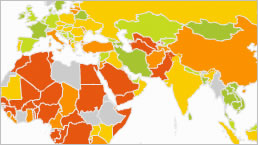The Group of Twenty (G20) recognizes the key role of financial inclusion in the realization that financial inclusion is a key enabling element in the fight against poverty and the pursuit of inclusive development is leading to an increasing focus on financial inclusion policies and initiatives. Reliable data covering the major components of sustainable financial inclusion development is critical to inform these policies and to monitor the effect of initiatives. Data also provides a starting point on which to base ambitious financial inclusion targets.
G20 leaders agreed at the Cannes Summit in 2011 to the Global Partnership for Financial Inclusion (GPFI) recommendation to support global and national financial inclusion data efforts and subsequently endorsed the G20 Basic Set of financial inclusion indicators at the G20 Los Cabos Summit in 2012, born out of the work of the GPFI.
As committed at the time of the endorsement of the Basic Set, and in support of the key focus area of financial literacy under the Russian G20 Presidency, the GPFI developed a more comprehensive set of financial inclusion indicators, with the aim of deepening the understanding of the financial inclusion landscape. This expanded set– including indicators on financial literacy and the quality of financial service provisioning and consumption– was endorsed at the G20 St. Petersburg Summit in 2013.
Under the leadership of the Chinese G20 Presidency and in consultation with G20 members and other GPFI members and implementing partners, new indicators were developed in 2016 to measure the use, availability, and quality of digital financial services. The expansion and revision of the existing set of indicators was driven by the development of new digital models, as well as the availability of new data on both the demand for and supply of digital financial services. The indicators measure both use of digital payments and access to digital infrastructure.


